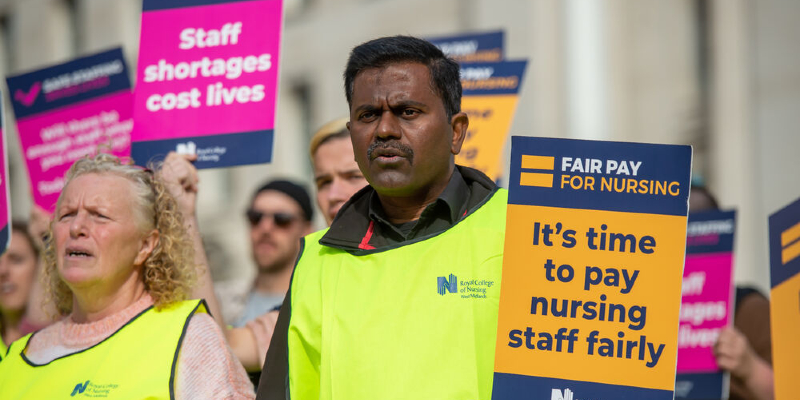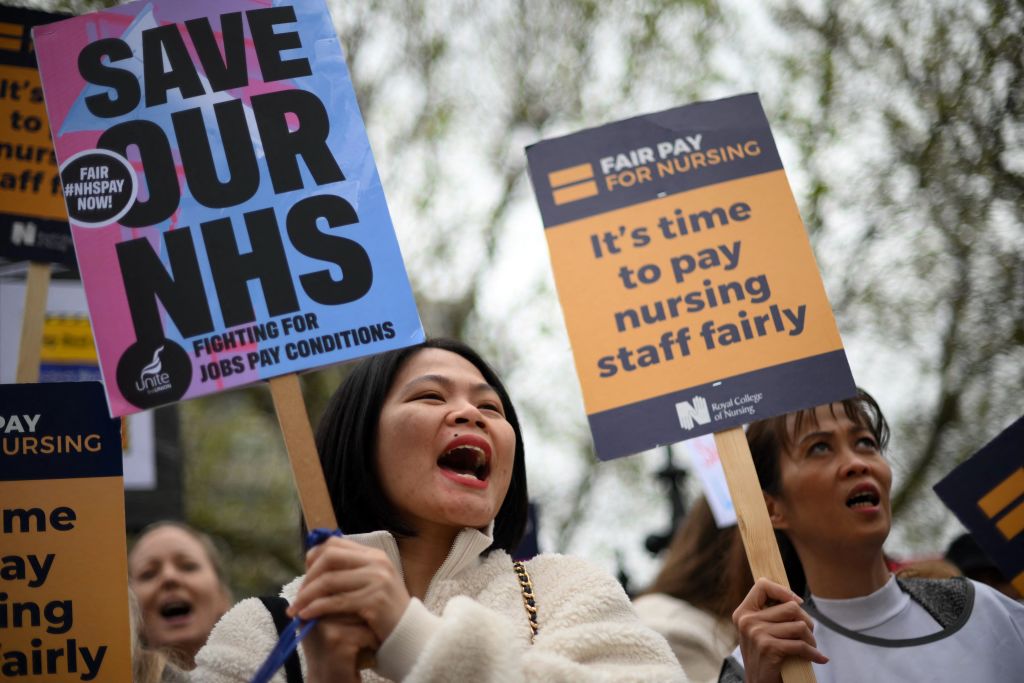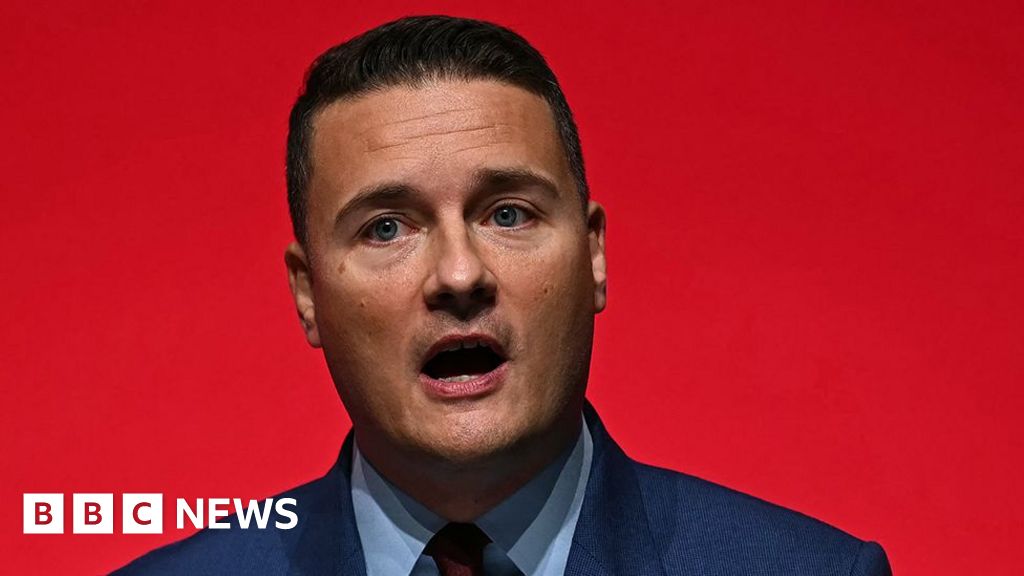Cowper’s Cut 342: ‘And then, A Miracle happens!’

Two important and interesting things were said about the biggest problem facing the management, politics and policy of the English NHS this week.
It isn’t surprising that neither of them were said at the governing Labour Party’s annual conference in Liverpool.
Both of these things were given in evidence to a public inquiry: the first was by an academic, and the second by an emergency doctor.
Bullying: neo-trickledown NHS cultural / political economics

Health Service Journal’s Emily Townsend reported on Professor Mary Dixon-Woods’ remarks to the Thirlwell (Lucy Letby) Public Inquiry about NHS culture that “the outer context more broadly, from ministerial level down, is highly impactful for culture and behaviour in NHS organisations.
“Pressures and behaviours (including bullying or aggressive behaviour) from those at the centre may be implicated in poor cultures at the level of NHS provider organisations.
“As well as being an unpleasant experience for those on the receiving end, they will tend to indicate that these are legitimate ways to behave that can be reproduced within organisations themselves.”
Professor Dixon-Woods neatly summarises the politically under-discussed downside of the New Labour ‘targets and terror’ new public management era. Professor Chris Ham’s ‘Reforming The NHS From Within: Beyond Hierarchy, Inspection And Markets’ and Nigel Edwards’ valedictory presentation to the 2023 Nuffield Trust Summit both addressed this vital theme.
I’m not aware of having heard anything about this subject from the current ministerial team, or their advisors.
That is a concern.
Tasks over people
Referencing the 2022 Messenger Review of NHS leadership, Professor Dixon-Woods noted that it had seen ministerial and national leadership conduct as a “major factor in organisational culture … It identified, for example, how this context creates pressures in the workplace that prioritise tasks over people.”
She suggested that NHS national leadership’s focus on targets and regulations “crowds out” attention that might be paid to the development of poor cultures: “we are not currently running the health system in a way that makes it easy for the running organisations to be absolutely clear about what [their] priorities are.”
If I were to nod any more vigorously in agreement, I’d get whiplash.
I have been suggesting that the NHS needs a chief anthropologist more than it needs any chief inspector for many years now. The culture of centralisation of power has gone far beyond a joke.
Professor Kevin Fong said the other of these two things, in his moving and powerful evidence to the Covid19 Public Inquiry on Thursday. The transcript is available here.
Again, this wasn’t a first. Professor Fong’s points about the impacts on staff had been foreshadowed by his remarks at the 2023 Nuffield Trust Summit, and that year’s NT Summit plenary presentation on workforce burnout.
On why there was a need for this programme of visits to see what was happening at the front line, Professor Fong said, “there was a gap between what the data could tell us and what we could understand by talking to people or actually being there.
“I think the data were important and necessary, but they weren't sufficient alone to give us a good picture of what the state of compensation or decompensation of these units was, and so after that, I felt that we had to have mechanisms that would better inform us, to give us the information, to give us the insight”.
Uncomfortable reality
“The scale of death experienced by the intensive care teams during Covid was unlike anything they had ever seen before. They are no strangers to death ... they look after some of the sickest patients in the hospital.
“But the scale of death was truly, truly astounding. I went into this and other hospitals where they said it would be routine to see three to five deaths a day. I worked on a shift where we had six deaths in a single shift. Another hospital told us that they had ten deaths in a shift, two of whom were their own staff.
“We had nurses talking about patients raining from the sky, where the nurses said that they – one of the nurses told me that they'd just got tired of putting people in body bags, and at the hospital where they said sometimes they were so overwhelmed that they were lifting – putting patients in body bags, lifting them from the bed, putting them on the floor, putting another patient in their bed straightaway because there wasn't time.
“We went to another unit where things got so bad, they were so short of resources, they ran out of body bags and they were instead issued with 9-foot clear plastic sacks and cable ties, and those nurses talk about being really traumatised by that because they had recurring nightmares about feeling like they were just throwing bodies away.
“These people are used to seeing death but not on that scale and not like that. And whatever the figures show you, the experience for them was indescribable. And when we talk about capacity in the healthcare systems, you know, the toll on those teams from that scale – and it really was like nothing else I have ever seen and certainly like nothing else those teams had ever seen in their experience – it was incredibly difficult.”
Smaller hospitals’ wicked dilemma
“For the smaller hospitals, the thing that I described of transferring patients out to try to create capacity, what it meant for the smaller hospitals was that they were drowning in patients. The bigger hospitals would come in, try to relieve that pressure by transferring patients out.
“When you … transfer patients out, you transfer out the most stable patients because they are the people who are most likely to be able to survive on more limited equipment in a moving vehicle for several hours if necessary.
“But what that meant for the smaller units is that they were left with a cohort of patients who were most likely to die. For the smaller units, when we talk about the scale of death, over the next few weeks those units would experience some mortality rates in excess of 70% in some cases.
“And I remember early in the visiting scheme going into a unit, a small unit, and them saying at the end of the day, ‘Thank you for coming, we thought we were alone, we thought we were doing it wrong’. And I just thought how have we left them feeling like this? How has no one told them this is not their fault, it is the surge that has come with Covid that has led this to happen?”
It is hard to read: it must have been far harder to experience.
To have been told by one hospital consultant that “we ran out of equipment. We ran out of drugs. We ran out of nurses. We ran out of goodwill.”
I’m not turning this into an attack on ‘the NHS was not overwhelmed’ rhetoric of the era (as deeply unlikely as the claim seemed even then). There was a hard balancing act for the national leadership to maintain some public confidence, particularly in the fact of the dominant Downing Street sloganeering to ‘Protect The NHS’ that risked seeing people not come forward for treatment.
It is best to close this section with more of Professor Fong’s words: “So much of this pandemic was about the concept of capacity and the capacity of the healthcare system. So much hinged upon that. But healthcare – capacity in healthcare systems is a complex feature of a complex system. It requires a complex assessment.
“There is, as I have mentioned, in the system a human element and a technical element, and we get good at managing technical elements, but the social element that we depend upon to close the gap between reality and expectation in a system that every single day wants to tear itself apart, and during Covid much more so, we do not pay enough attention to.
“ … The pandemic was managed by the teams in the frontline areas day in, day out, not just on intensive care, throughout the hospital, throughout the ambulance service, in the community, general practice, in our social care facilities, in our care homes.
“The know-how of how to stop a system from tearing itself apart when faced with a challenge that should have been insurmountable exists still within those people and it must be preserved. I'm not sure we are doing enough to preserve that operational, organisational memory. And organisational memory is short.
“So the preparations for next time need to start now and need to be properly resourced, need to be captured.
Workforce wellbeing
“We managed the technical aspect of this complex system: we do not look after the social aspect. We go in and we check our machines and our drugs every day to make sure that they are there when we need them in a difficult moment.
“No one really does that for our staff. We do not have the right mechanisms to measure and monitor, protect and promote the wellbeing of the human workforce upon whom everything depends, whether you are in a pandemic or not.
“Wellbeing of the workforce should be a central strategic priority for the NHS, whether it is in the pandemic or not. And it needs better resourcing and it needs better attention than it has had.”
Amen.
I fully get that almost everybody would like to forget the pandemic.
But.
Denial is not just a river running through Cairo.
We can learn from the pandemic, of course. Doing nothing is always an option: it’s just that in this case, it’s a truly terrible one.
Professor Fong shows us that Covid19 broke a lot of health and care staff, on the back of a long tradition of not giving much of a shit about staff wellbeing.
Professor Dixon-Woods describes some of the key drivers of the extreme dysfunction of NHS culture: the kiss-up, kick-down, lawyered-up approach that hasn’t even delivered ‘performance’ through fear for some years now.
These things are linked, and they are at the root of a lot of current NHS performance problems. The pay disputes (of which more below) are about money, but they are about other things, too.
Reminder for 'NHS-must-take-productivity-challenge-on-the-chin' ppl, what staff DID take on the chin was the pandemic. Then they had to go to picket lines to keep their pay anywhere near inflation.
— Ben Clover (@BenClover) September 26, 2024
So a fair bit of discretionary effort has been withdrawn https://t.co/P4fS1YeikA
There is a longstanding theory-cum-cliché that the NHS runs on intrinsically un-measurable staff goodwill, in the form of discretionary effort and unpaid overtime.
I think we can post-pandemic, for the first time ever, actually map and measure what NHS staff discretionary effort was worth. It was worth what has very clearly and permanently (and in my view, rightly) been withdrawn. It was worth the gap that we can see in a system whose productivity is falling despite more resources.
If we are serious people, then we don’t have the luxury not to care about that.
RCN rejects the 5.5% pay offer
Timed to co-incident with the first full day of the Labour Party conference in Liverpool this week, the Royal College of Nursing announced that its members had voted to reject the Government’s 5.5% pay award.

64% of the 145,000 nurses who voted (about half the RCN membership in the NHS in England) chose not to endorse the award - it is not an offer, and so this vote does not immediately bind the RFCN into strike action.
Responding on John Pienaar’s Times Radio show, Wes Streeting said, “I’d say to nurses and in fact the whole NHS workforce, we know what you’ve been through, we know how hard it has been, but they also know that for the first time in a long time they’ve got a government that’s on their side, wants to work with them, to take the NHS from the worst crisis in its history, to get it back on its feet and make it fit for the future.
“We’re going to be one team, we’re going to do it together and we’re going to do something we can be proud of for the rest of our lives. You’re looking for a bit of goodwill? I’ve already got the nurses’ goodwill. I need to repay that goodwill by giving them the tools they need to do the job and that’s exactly what I’m going to do.”

But as Isabel Hardman noted in The Spectator, this is far from unexpected: the junior doctors have shown other professions that striking gets results. “The crisis in nursing isn’t just about pay: it is about conditions and understaffing, but ministers won’t be able to fob nurses off with talk of improving those issues while refusing to discuss pay.
“The nurses have made an entirely rational decision, one they were led to by ministers.”
No can do
Speaking at a Labour Party conference event held by the IPPR think tank, Wes Streeting said, “what shocked me in the last couple of months, despite being the secretary of state for social care, my line of sight into the social care system is really not very clear at all.
“The levers I have available to pull to drive improvement are virtually non-existent, and when I was asked what can I do to help the system to do X or Y or Z, the response I got was, ‘Oh well we can send a letter out to the system’.”
Responding to the prospect of working-to-rule industrial action by BMA GPs and pharmacists, Streeting added, “I think there’s been an unhelpful degree of saber-rattling and threats of collective action … actually I find talking to GPs and pharmacists, people are up for change, they’re up for the challenge and they want to see us deliver the things that we said we will. So I feel actually confident despite the headlines.”
Placeholding with Labour
Currently, there is a ‘placeholder’ feel to Labour’s health policy and politics. This is an inevitability, given that the Budget and associated comprehensive spending review is not with us until 30 October, and their ten-year NHS reform plan does not drop until spring 2025. (We must surely hope that it will emulate the success of the last one.)
This has left Labour with the habits of opposition, which is the search for media attention and relevance through the medium of saying things, but doing this in government.
The down-side of this is that we have really no idea about what Labour actually plan to do to improve the dreadful state of the NHS. We hear the blame game directed towards the Conservative And Unionist Party’s track record in government, and that is Not Wrong.
Our problem is that in the absence of information, Labour’s plans to triple-shift (from analogue to digital, from treatment to prevention and from hospital to community) do start to feel a bit ‘and then, A Miracle happens!’, which could be more reassuring.
Incoming Labour governments have form on this. The first Blair administration famously didn’t have a health policy: “we haven’t got a health policy: your job is to get us one”, as PM Tony Blair told Alan Milburn (now semi-officially back, and who has for ages been less formally advising Streeting as ‘Cut’ readers have known for longer than most).
Milburnism
It is, by the way, worth revisiting Mr Milburn’s last significant public contribution about NHS reform. It is ten years old, and appeared in ‘Seizing The Opportunity’: this 2014 NHS Providers lecture and publication (the non-Milburn bits of which were written up by me, from interviews).
It’s an interesting read because it has aged so very badly. Milburn’s hypothesis that “the balance has swung far too far towards top-down regulation as the primary instrument for improving standards” reads particularly poorly, given that it was emergingly obvious even at that time (and hugely much more so since) that NHS regulation was, and remains, wildly ineffective at noticing huge problems in maternity, mental health and other major health and care services.
But this is not by a wide margin the most stupid thing that Mr Milburn said in 2014: “faced with a rising tide of demand for care, doing more with less may look like mission impossible, yet consider this: healthcare is surely unique among modern industries (and that is what we are, an industry) in that improvements in quality have not been matched by reductions in cost.
“Think of the price and quality of your car, mobile phone or computer. Doing more with less and doing it better, more quickly and more cheaply has become the new normal.
“This is the time for healthcare to catch up.”
One must have a heart of stone not to laugh.
Mr Streeting’s speech

The blame-fiesta of the Darzi Review was (unsurprisingly) a major theme of Mr Streeting’s conference speech: “never forgive, never forget, never let the Tories do it again”.

In a comically bad piece of political judgement and timing, un-named senior NHS sources (who may in the past have been prone to posting long, long threads on Kiss (formerly Twitter)) briefed BBC News that the “NHS is broken” rhetoric was unhelpful. Now that’s what I call strategy!
Streeting had to respond, and he did: “I know the doctor’s diagnosis can sometimes be hard to hear. But if you don’t have an accurate diagnosis, you won’t provide the correct prescription. And when you put protecting the reputation of the NHS above protecting patients, you’re not helping the NHS – you’re killing it with kindness.
“So I say respectfully, but unequivocally, I won’t back down. The NHS is broken but not beaten, and together we will turn it around.
“Make no mistake, the Tories had a plan for the NHS: mismanaged decline; a status quo so poor, people are forced to raid their savings to go private; a crisis so bad that seven in ten people now expect charges for NHS care to be introduced.
“I’ve said it before, I’ll say it again. Over my dead body. We will always defend our NHS as a public service, free at the point of use, so whenever you fall ill, you never have to worry about the bill.”
Blairite TINA
We then got the obligatory Blairite TINA (there is no alternative) argument: “we can only deliver recovery through reform. Without action on prevention, the NHS will be overwhelmed. Without reform to services, we’ll end up putting in more cash for poorer results.”
“Reform or die. We choose reform.”
Streeting told his party’s conference that the HIT squads are going in.
High-intensity theatre use specialists from GIRFT and elsewhere are going to be targeted on areas with highest levels of people off work sick: “we’re sending crack teams of top clinicians to hospitals across the country to roll out reforms – developed by surgeons – to treat more patients and cut waiting lists … the first twenty hospitals targeted by these teams will be in areas with the highest numbers of people off work sick. Because our reforms are focused not only on delivering our health mission but also moving the dial on our growth mission too.
“We will take the best of the NHS to the rest of the NHS, get sick Brits back to health and back to work.” Well, the sentiment is admirable. I suspect that what will emerge is that the successful high-intensity theatre projects rely strongly on highly-motivated leaders and teams in relatively long-standing high-performing institutions which do not resist (and probably actively support) innovation.
It may well prove to be that, in the same way as Sir Sam Everington’s Bromley-By-Bow Health Centre, these admirable innovations may not be highly replicable.
Because culture, and how you treat your workforce, are things that matter greatly. Labour will learn this lesson: hopefully, very soon.
Behold: the re-re-re-announcement of patient choice!

It was reassuring to see Mr Streeting become the Health Secretary who re-re-re-announced the already-extant-if-theoretical patient choice, with the words “our ten-year plan will give all patients – rich and poor alike – the same information, the same choice, the same control … starting in the most disadvantaged areas, we will ensure patients’ right to choose where they are treated, and we will build up local health services so it’s a genuine choice.
“And where there’s capacity in the private sector, patients should be able to choose to go there too, free at the point of use, paid for by the NHS. Because working people deserve to be treated on time, just as much as the wealthy”.
Mmmmmmm. If this is in any way serious, then that means creating or buying in A Lot Of Spare Capacity. Make or buy, that will be expensive.
There is also the track record of what patients do with their choice to consider. Happily, Mr Streeting can just pop and ask the new Labour MP for Shipley about this.
Recommended and required reading
In a welcome outburst of sanity, the BMA has voted to overturn its previous vote and adopt a neutral stance towards the Cass Review of gender dysphoria services, as reported by the New Statesman.
Financial Times long read on CAR-T cell treatments for cancer.
FT again, on the trend of younger people on sickness benefits.
More FT: a long read on tackling TB to address anti microbial resistance.
RCP Fellows’ letter to The Times on the reasons to halt the rollout of physician associates, alleging that Parliament has been misled.
Interesting HSJ report about Black Country ICS clawing back payments for emergency services provided to the populations of its neighbouring ICSs.
Law Society research on how housing legal aid reforms would save the NHS £15 million a year. Every little helps …






